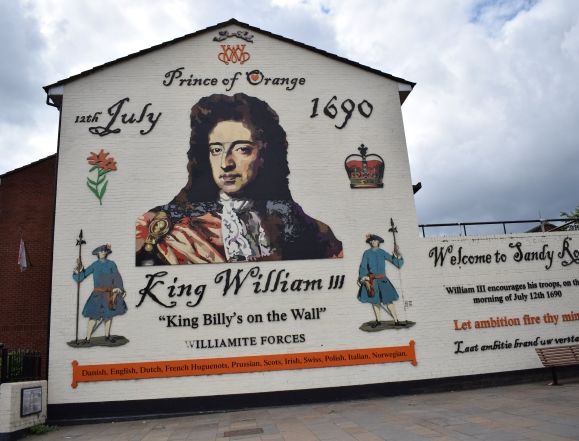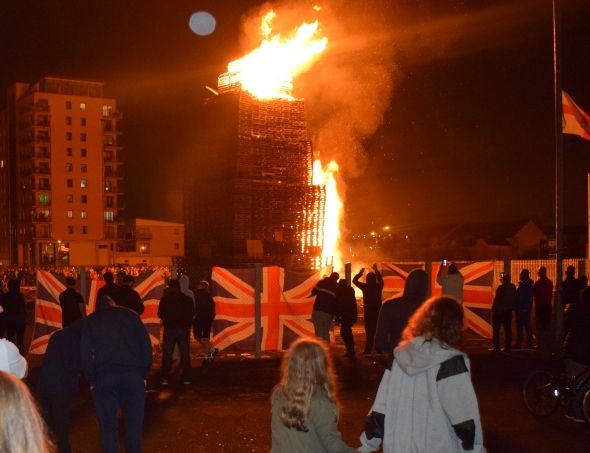Clues of discontent are everywhere in Belfast, once you start to look. Sitting in the passenger seat of a car parked in the city’s unionist heartland, you look up to signs pinned on lampposts, declaring: “Loyalist Sandy Row Will NEVER Accept A Border In The Irish Sea!”, beside a union flag. The symbols of Britain are worn here with a pride unseen anywhere else in the UK, especially around the time of the Orange Order marches on the Twelfth of July. As Protestant Northern Ireland warily acknowledges the region’s 100th birthday with 100 processions across the six counties, there is a palpable sense of unease. Unionism is caught between irrelevance in Westminster and demographic changes reducing Protestants to a minority group. There is fear that at some point the strain may become too much. Could there be a return to violence not witnessed since the Troubles’ darkest days?
The Orange marches are a set of walks held annually to celebrate William of Orange’s victory over Catholic forces at the Battle of the Boyne in 1690. The anniversary is marked by the building of towering bonfires, street parties and elaborate processions, accompanied by military-style dress and traditional marching music. The pandemic has meant smaller, localised marches this year, though some settings are still rammed. While people enjoy the holiday as a family occasion, it has historically also been a moment of tension and violence. This year, Brexit and the dreaded Northern Ireland protocol, which establishes the sea border, is on the minds of many.
There is a widespread tone of desperation and distrust. On the Twelfth, I headed to Protestant east Belfast’s Templemore Avenue, abandoning my taxi halfway up the road, which is packed despite the pandemic. The area was filled with brightly coloured bands, men in red tunics and bearskins, women decked out in pork-pie union flag hats. I stood next to a man in a Protestant-blue checked shirt. He hadn’t seen Northern Ireland as divided since the Troubles, he said, and predicted there would be violence if the authorities clamped down on the bonfires. The protocol had inflamed the situation, he said.
This anger is represented at the top of the Protestant political establishment. The DUP struck a confidence and supply arrangement with Theresa May’s government when she lost her majority in 2017. They decided not to back her EU withdrawal agreement, contributing to the fall of her premiership in 2019. Boris Johnson, having broadcast his unionist credentials, then ushered in the sea border to which the DUP is so opposed. The party has been in a state of crisis ever since.

In a statement after meeting members of the Orange Order prior to the Twelfth celebrations, the party’s new leader Jefferey Donaldson derided the protocol and demanded its immediate removal. Members of the Orange Order (also called the Orange Institution) “have felt the economic impact of the Northern Ireland protocol as well as understanding the constitutional damage it brings,” he said. “The Institution stands alongside every single unionist elected representative in Northern Ireland in opposition to the protocol and the barriers to trade it has created,” he added. But is the new leader’s rhetoric really reflected in the feelings of the people he is supposed to represent?
The day before, the streets of west Belfast were quiet, except for the building of bonfires. The tallest was adorned with the Irish tricolour, the Free Palestine Flag, a banner supporting Sinn Féin MP Paul Maskey and the Starry Plough flag, a banner originally used by the Irish Citizen Army. All were to be burned together as symbols of the same community. A man sat on his phone in his car, the door ajar, keeping lookout in case there was a scurrilous nationalist attempt to burn the pyre before midnight. Residents of the council houses near the fire had voluntarily covered up their windows to protect their living rooms against the fierce, raw heat.
East Belfast resident Sophie seemed unbothered by the potential damage to her home, but looked forward to the parades. The way that unionism is celebrated during this holiday is an uncanny mix of intimidating, violent optics designed to rile nationalists, and a desire to protect the parade's fun for all the family, more akin to a summer fete. In recent years, there have been changes: marches are less likely to parade past Catholic churches singing offensive songs, the Pope is now seldom seen atop bonfires. The pyres themselves have in ways become commercialised: instead of scraps of wood and old chairs collected by small boys to build a humble blaze, nowadays, on the morning of the 11th, huge trucks carry pallets for spectacular structures. If the fires have moved on, has loyalism in Ulster also changed?
The bonfires attract strange moths to them. Some Orange Order members deride what they dub the “blue-bag crew,” who descend on Belfast with cans of Tennent's lager in carrier bags, aiming to get drunk and create disorder. While the fire service has its busiest night of the year putting out bonfires, the occasion passes off with no rioting. In the tragic history of politics here, 2021 is one of the quietest Orange days on record.

This is partly due to coronavirus restrictions, but there are some who think there is more to it than that. The violence earlier this year was sometimes attributed to the Brexit deal, but mainly the causes of that disorder lay elsewhere. Thomas, 71, who was part of the Catholic civil rights movement in the late 60s and early 70s, points to the divergence between politicians’ angry rhetoric over the protocol and the working-class loyalist community’s lack of desire to take part in the kinds of action depicted on dozens of murals across the city. In his view, “the unionist politicians are trying very, very hard to work up the loyalists to be annoyed at the protocol,” without sanctioning violence. But they are failing to sustain it, partly because the community already sees the gaping difference between Northern Ireland and the UK over a whole range of issues, not just this one.
Many here are irritated by the protocol, but their anger was more at politicians and Westminster than Catholics. “I don’t know anything about that, I’m afraid,” said one Belfast housewife when I asked her what she made of the disruption at the border. The situation bears a resemblance to where England was in 2019, when the Brexit process was subsumed into complicated parliamentary wrangling. Some of the emotional drama has been lost now it feels as if the main issue is politicians arguing over sausages. For the moment, the region’s demographics just about favour the DUP. But as many Catholics enjoy saying, the majority of schoolchildren are now from their community. When those children come of age with their own set of demands, things may look different for loyalists. For now, it seems that violence will be dampened in Northern Ireland, but whether that will be permanent is harder to tell.












